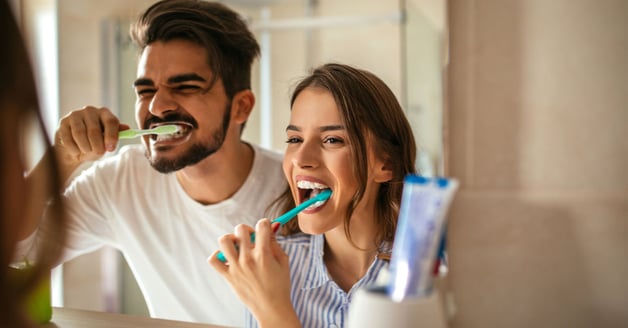
This article was updated on 12/15/20.
With the turn of the year comes another fresh opportunity to set goals, make plans, and develop a better you. But, as most of us well know, it’s not always easy to commit to and accomplish our New Year’s resolutions.
Usually, the reason New Year’s resolutions don’t turn out to be the life-changing milestones we want them to be is because we try to do too much, too fast, and it’s simply unsustainable. The better option is to start with two or three goals that are well within our grasp, then build from there. And you don’t need to wait until next January 1 to try again.
For those interested in improving their oral health, here are three suggested resolutions that are highly attainable, but will also have a profound impact on your health:
Improve your oral home care habits
You know how to do these things and you’re probably already doing at least some of them. The real value of setting this goal and sticking to it is to establish a thorough set of habits that will improve your oral health.
- Brushing - You should be brushing your teeth at least twice every day (preferably just before bed and just after waking) with a soft-bristled toothbrush for at least two minutes each time.
- Flossing - You should be cleaning between your teeth with traditional dental floss, floss holders, water picks or whatever tool and method is easiest and most convenient for you.
- Rinsing - You should be rinsing at least once per day with an antibacterial mouthwash to help clean your mouth.
All three steps are simple and quick on their own, but it’s the daily consistency that really matters to your ongoing oral health.
Eat better for oral health
Hopefully, you’re already doing this to some degree, but check to see if these helpful components are in your diet:
- Multivitamin - A standard daily multivitamin is important for your overall health, but your teeth and gums especially benefit from the vitamins and minerals that are connected to remineralization of the enamel on your teeth and that help stave off inflammation and infection.
- Calcium - Whether or not your daily multivitamin includes supplemental calcium, it’s important to eat plenty of foods that include calcium. The most effective choice, ounce-for-ounce, is dairy products including milk and cheese.
- Phosphorous - Quality meat, eggs, and fish are excellent sources of this vital mineral that many people don’t realize your teeth need just as much as calcium.
- Polyphenols - These often overlooked micronutrients found in tea and cranberries - among many other foods - can play an important role in reducing the accumulation of bacterial plaque on your teeth, therefore lessening the risk of cavities.
- Crunchy foods - As long as it’s not too hard, anything with a crunch to it provides a strengthening workout for your teeth and gums, and nearly all natural crunchy foods are rich in nutrients your mouth needs: think carrots, apples, and celery.
- Sugarless gum - Studies have shown that chewing sugarless gum after a meal can greatly reduce the immediate impact of acidic food and drink on the integrity of your tooth enamel, and helps cleanse the mouth of tiny food particles and increased bacteria as well as or better than drinking a glass of water.
Now, don’t get overwhelmed by the list! It’s in priority order, but you’re better off starting with the eating habit that’s easiest for you to adopt and implementing the rest one-by-one.
Stick to regular dental visits
Going to the dentist every six months has been a recommended goal since we were kids. But when you’re juggling a busy schedule, dealing with a tight budget and not experiencing obvious dental pain, it’s easy to put this important visit off or simply not think about it.
But the professional cleaning and examination you receive at your semi-annual dental visit is a vital step in rounding out your new focus on oral health. Here’s how to make sure it happens:
- Budget for it - If you have dental insurance, get informed on how to use it and what you can expect to pay out of pocket, then make sure that amount is budgeted as soon as possible. If you don’t have insurance coverage, consider joining a dental discount plan, then calling around to local dentists to determine what your out of pocket cost will be, and do the same.
- Make your appointment - No more procrastinating! Pick up the phone or go to the dentist’s website and make an appointment. Write it down, set a reminder in your phone-- whatever you need to do to make sure you don’t forget about it.
- Stick to it - As the appointment draws closer, don’t entertain thoughts of canceling just because “my teeth are fine” or because of unwarranted anxiety. Every six months, it will get easier to stick to your new habit and your oral health will be all the reward you need to motivate you.
Again, don’t try to take all of these resolutions on at once. Give yourself a few weeks with each one so you’re sure you’re going to adapt and maintain these oral health habits for life.
